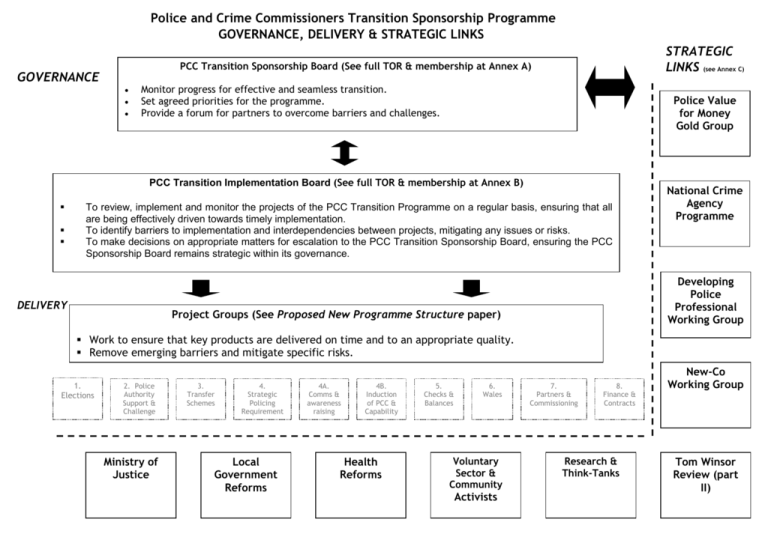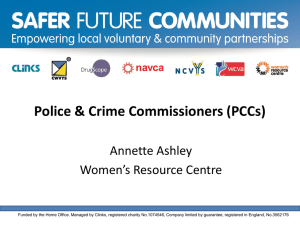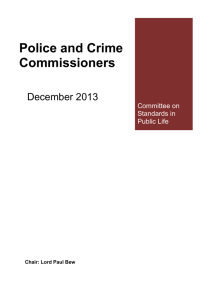Annex A PCC Transition Sponsorship Board Terms of Reference To
advertisement

Police and Crime Commissioners Transition Sponsorship Programme GOVERNANCE, DELIVERY & STRATEGIC LINKS STRATEGIC LINKS (see Annex C) PCC Transition Sponsorship Board (See full TOR & membership at Annex A) GOVERNANCE Monitor progress for effective and seamless transition. Set agreed priorities for the programme. Provide a forum for partners to overcome barriers and challenges. Police Value for Money Gold Group PCC Transition Implementation Board (See full TOR & membership at Annex B) To review, implement and monitor the projects of the PCC Transition Programme on a regular basis, ensuring that all are being effectively driven towards timely implementation. To identify barriers to implementation and interdependencies between projects, mitigating any issues or risks. To make decisions on appropriate matters for escalation to the PCC Transition Sponsorship Board, ensuring the PCC Sponsorship Board remains strategic within its governance. DELIVERY National Crime Agency Programme Developing Police Professional Working Group Project Groups (See Proposed New Programme Structure paper) Work to ensure that key products are delivered on time and to an appropriate quality. Remove emerging barriers and mitigate specific risks. 1. Elections 2. Police Authority Support & Challenge Ministry of Justice 3. Transfer Schemes 4. Strategic Policing Requirement Local Government Reforms 4A. Comms & awareness raising 4B. Induction of PCC & Capability of OPCC Health Reforms 5. Checks & Balances 6. Wales Voluntary Sector & Community Activists 7. Partners & Commissioning 8. Finance & Contracts Research & Think-Tanks New-Co Working Group Tom Winsor Review (part II) Annex A PCC Transition Sponsorship Board Terms of Reference To develop, agree and review on a regular basis the PCC Transition Programme. To ensure that the PCC Transition Programme and its Projects contribute to and ultimately secure an effective, coherent and seamless transition to PCCs. To provide strategic oversight of the work undertaken by the Project Groups. To provide a regular forum for joint discussion and communication on the opportunities and challenges facing transition to PCCs. To monitor progress on delivery, to identify barriers to delivery and to develop solutions to them; to advise on remedial action where necessary. To act as the main reporting channel to Ministers on PCC transition issues. To ensure that the implications of the Board’s programme of work are taken into account across other reform agendas and vice-versa. To ensure that all key partners are properly engaged with the Transition Programme. Membership* Nick Herbert (Chair) Stephen Rimmer Stephen Kershaw Mandie Campbell Sir Hugh Orde Zoe Billingham Kit Malthouse Bob Atkins Catherine Crawford Mark Burns Williamson Craig Mackey Paul Kett Patrick White Fraser Sampson Jane Furniss Mark Castle Nick Gargan Cllr Henri Murison 116096774 Minister of State for Policing and Criminal Justice Director General, Crime and Policing Group. Director of Policing Director of Drugs, Alcohol and Partnerships President Association of Chief Police Officers Her Majesty’s Inspector of Constabulary Deputy Mayor for Policing Chief Financial Officer, Mayor’s Office for Policing and Crime Chief Executive, Mayor’s Office for Policing and Crime Chair of the APA Deputy Commissioner Met Police Director, MOJ Director, CLG Chair, APACE IPCC Chief Executive APA Chief Executive NPIA LGA * Members of Project Groups and Project Leads will be invited to attend the PCC Transition Sponsorship Board as and when required, the Sponsorship Board will also request highlight reports from the transition project leads to ensure progress is monitored. 2 Annex B PCC Transition Implementation Board Membership* Stephen Kershaw (Chair) Mark Castle Bob Jones Paul Minton Steve Oakley Vicky Harrington Catherine Crawford Jacky Courtney Tom Flaherty Judith Mullett Mark Norris Steve Oakley Ann Marie Field Oscar Ramudo Amobi Modu Sarah Severn Ziggy MacDonald Stuart Gibby Sharon Sawers Home Office, Director Policing Chief Executive, Association of Police Authorities Association of Police Authorities National Policing Improvement Agency Independent Police Complaints Commission Her Majesty’s Inspector of Constabulary Mayor’s Office for Policing and Crime Association of Police Authority Chief Executives Association of Chief Police Officers Metropolitan Police Service Local Government Association Independent Police Complaints Commission Head, Police Reform Unit Deputy Head, Police Reform Unit Head, Community Safety Unit Head, Police Protective Services and Strategic Centre for Organised Crime Head, CPG Group Finance Unit Head, Counter Terrorism Policing Unit Deputy Director, Communications Directorate Secretariat: Andrew Woodward – (Police Reform Unit, HO) * Other members working on the Projects will be invited to attend the PCC Transition Implementation Board as and when required, the Implementation Board will also request highlight reports from the transition project leads in advance of the Sponsorship Board to ensure progress is monitored. 116096774 3 Annex C STRATEGIC LINKS There are a range of reforms within Policing and activities outside policing that will present opportunities and risks that need to be managed in order to not only achieve a seamless transition to Police and Crime Commissioners but ensure that we have done all we can collectively to ensure that PCCs can make a positive impact from the very beginning. Below are some key reforms and opportunities which the programme needs to have a strategic link to and the reasons for this: Police Value for Money Gold Group The Home Secretary has set out why the overall settlement for policing is necessary, challenging, but manageable. Ministers have been clear that the primary responsibility for delivering the settlement can only be local. PCCs will be responsible for local police force budgets and will be required to ensure value for money. National Crime Agency Programme The NCA will be working closely with Chief Constables, leaders of other law-enforcement organisations, Police Authorities, Police and Crime Commissioners and the government to ensure that the NCA delivers the maximum protection possible for communities within the resources it has available. The Strategic Policing Requirement sets out the national threats which local forces need to tackle across force boundaries. This will be an important lever for ensuring that the policing capabilities, capacity and interoperability required to support the NCA are maintained. PCCs will have responsibility for the totality of policing and the public will hold them to account for this – they will therefore be central to the delivery of the Strategic Policing Requirement and the work of the NCA. Developing Police Professional Working Group The Professional Body will take responsibility for developing professional skills and leadership in the police service and PCCs will have a key role to play in shaping this. They will also be responsible for the budgets that will pay for many of the products offered by the body. New-Co Working Group PCCs are envisaged to be owners of the company, but police authorities will be initial owners. There will need to be a process for police authority owners to be replaced by PCCs once elected and this has been considered in the governance proposals for the company and legal structure. Tom Windsor Review (part II) PCCs will have a keen interest in the recommendations and implementation of the Windsor review findings given the likely impact on police forces. 116096774 4 Ministry of Justice The Home Office Structural Reform Plan sets out how we should cooperate with the Ministry of Justice to provide Police and Crime Commissioners, with as much information as possible on crime levels, sentencing and rehabilitation of offenders. There is also an ongoing relationship to ensure consistent policy development between the two departments. PCCs will also have a key role in the criminal justice system and we are working with MOJ colleagues to ensure this is the case and arrangements are reflected in primary legislation where necessary. PCCs could potentially inherit powers that currently sit with MoJ. For example, the Government will be consulting on PCCs becoming the commissioners of victims services. Local Government Reforms The PCC relationship with local authorities will be critical in working together to reduce crime. Councillors will sit on the police and crime panels to scrutinise the PCC and local authority officials will be involved in the administration of the panels. The programme will need to ensure that we coordinate with DCLG, including on their proposals for precept to ensure that our combined proposals work well together. It is also possible that the elections for city mayors, subject to a positive referendum, could take place on the same date as the election for PCCs. If this is the case, DCLG, the Home Office and the Electoral Commission will need to work closely together to establish a clear narrative on the interplay between elected mayors and PCCs, and explain the different boundaries on which the elections are taking place. Health Reforms It will be important to recognise the links between health and community safety/crime reduction and need for PCCs to work closely with local health bodies including Health and Wellbeing Boards in order to influence health spend and ensure appropriate health outcomes for drug misusing offenders. Voluntary Sector and Community Activists Key to the successful roll-out of Police and Crime Commissioners will be the engagement of this wider range of partners who will interact with and be impacted upon by Police and Crime Commissioners. There is a wide range of partners across the community landscape that the PCC will need to establish effective, co-operative working relationships. These include the voluntary and community sector, community safety partnerships, and local authorities, all of whose engagement is crucial to the successful roll-out and implementation of PCCs. Recognising PCC role as one of a number of community leaders – need to work together to define and meet local priorities and concerns. PCCs will have to ensure that public priorities are acted upon, victims are consulted and that the most vulnerable individuals are not overlooked. 116096774 5 Commissioning role likely to involve voluntary and community sector and the public mandate will galvanise the sector to get even more involved in helping address the causes of crime. Research and Think-Tanks As Part of the awareness raising of PCCs and ensuring that the election debate is well informed, Think Tanks contribute to research has a key role to play to inform the elections, help influence manifestos and support PCCs in the future. 116096774 6










